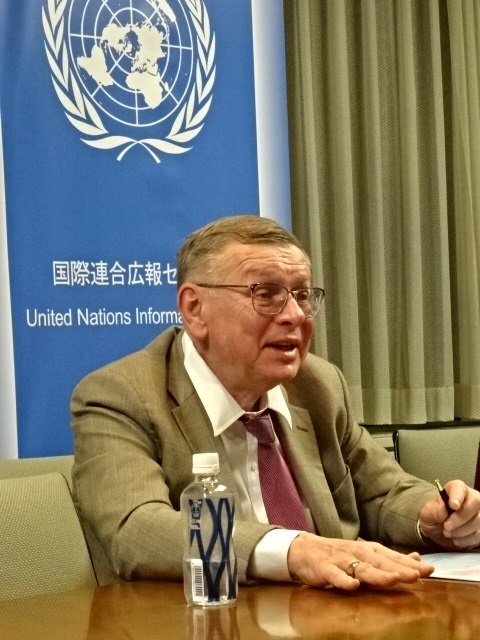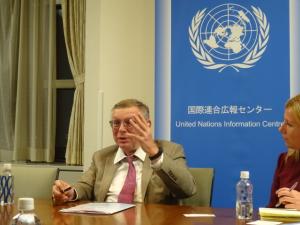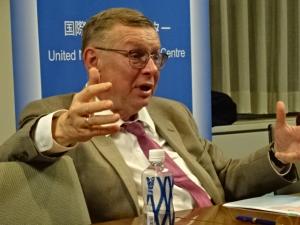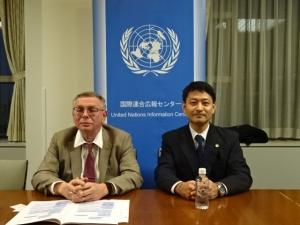Interview with Mr. Alexandre Zouev, the Assistant Secretary-General for Rule of Law and Security Institutions
国連本部平和維持活動局事務次長補 Alexandre Zouev氏インタビュー
インタビュアー:法律サービス展開本部国際業務推進センター幹事 島村洋介(第二東京)
Q:Can you explain about the work of your Department? What kind of role lawyers can play especially in the conflict or post conflict situations?
国連平和維持活動局の仕事について、説明してください。特に、紛争中や紛争後の状況において、弁護士はどのような役割を果たすことできるのでしょうか。

I should start with saying that in the United Nations (UN), which is an inter-governmental organization, we work mostly with governments of Member States, but we pay special attention to working with civil society including not only civil society organizations and NGOs but also professional associations. In my 30 years with the UN, I worked with American Bar Association on certain projects and some other national professional organization of lawyers. We believe that it is very important partnership.
国連と弁護士会
最初に、国連は、政府間機関であり、ほとんどの場合は、加盟国の政府と仕事をするのですが、市民社会組織およびNGOだけでなく専門職団体を含む市民社会と仕事をすることに特別の注意を払っているということをお話すべきであると思います。私の国連での30年の中で、私は、いくつかのプロジェクトで米国法曹協会と、また、その他の国の弁護士の専門職組織と仕事をしてきました。私たちは、これは、とても重要なパートナーシップであると考えています。
I am very glad that you are working with Human Rights Council, the Office of High Commissioner for Human Rights (OHCHR) and the Office of High Commissioner for Refugees (UNHCR). There are many different vulnerable groups, which need legal assistance and UN is working on this but definitely such bar associations like yours can provide a lot of direct support and address specific concerns. It is very important for us in the UN that we work together.
日弁連が、人権理事会、人権高等弁務官事務所(OHCHR)、そして、難民高等弁務官事務所(UNHCR)と活動をされていることを嬉しく思います。法的支援を必要とする、多数の多様な脆弱な集団があり、国連はこの仕事をしていますが、間違いなく、日弁連のような弁護士会は、多くの直接の支援を提供することができ、また、特定の課題に取り組むことができます。国連にいる私たちにとって、一緒に活動することは、とても重要です。
Work of Rule of Law and Security Institutions and lawyers
My office of Rule of Law and Security Institutions belongs to the UN Department of Peace Operations (DPO). We have other parts of the UN which work on the related issues such as OHCHR and UNHCR, but also the United Nations Development Program (UNDP) has all of which support national capacity-building and judicial reforms in non-crisis countries, while we mostly work in conflict-affected countries as peacekeepers or in post-conflict countries. When we transition from peacekeeping to sustainable development phase, UNDP definitely does a lot.
法の支配・安全保障機関の仕事と弁護士
私の法の支配・安全保障機関の事務所は、国連平和活動局(DPO)に属しています。私たちの仕事が扱う問題については、OHCHRやUNHCRといった国連の他の部門もあり、国連開発計画(UNDP)は、危機状態ではない国において、すべて国の能力構築を支援し、また、司法改革を行っていますが、私たちは、専ら、紛争による影響を受けた国での活動や、紛争後の国で平和維持活動を行っています。私たちが、平和維持から、持続可能な開発の段階へと移行する時に、明らかに、UNDPが多くの活動を行います。
Our justice components in the field support national authorities with immediate stabilization and security tasks, the protection of civilians and extension of State authority. We contribute to political solutions to conflicts and promote peaceful societies that respect the rule of law. Let me give you an idea of what our Judicial Affairs Of¬ficers do. They help national authorities to: i) deliver basic justice services; ii) assist nationally-led investigations and prosecutions of atrocity crimes and crimes that fuel conflict; iii) support the resolution of disputes over land and other resources that drive conflict; iv) reduce the level of prolonged and arbitrary detentions; v) enhance the professionalism and accountability of judicial staff and systems; vi) develop and implement national justice reform strategies; and vii) strengthen the legislative and regulatory framework.
私たちの現地における司法部門は、迅速な正常化と安全保障の任務、民間人の保護と国家の権限の拡張について、国の当局を支援することです。私たちは、紛争を政治的に解決することに貢献し、法の支配を尊重する平和な社会を促進します。私たちの司法問題事務所がどのようなことをしているかについてお話させてください。私たちの事務所は、国家の当局が、次のようなことを行うのを支援します。(1)基本的な司法のサービスを提供すること。(2)残虐な犯罪や、紛争を激化させた犯罪を国の主導で捜査し、訴追するのを援助すること。(3)紛争の基となった土地その他の資源に関する紛争の解決を支援すること。(4)長期化した拘禁、及び、恣意的拘禁を減らすこと。(5)司法職員と制度の専門職意識と説明責任を高めること。(6)国の司法改革戦略を発展させ実施すること。(7)法律及び規則の枠組みを強化すること。
Point to be noted is that we do not work in isolation. To facilitate the provision of joint delivery rule of law assistance and greater coherence and integration across the UN system, OROLSI works within, and is co-Chair of the Global Focal Point for the Rule of Law (GFP) arrangement promoting joint rule of law approaches together with UNDP, as well as UN Women, OHCHR, UNODC, UNHCR, EOSG, UNOPS and other UN entities. The GFP coordinates the rapid deployment of expertise; supports to joint design, planning and implementation of rule of law programmes; undertakes joint assessments; mobilizes resources; and identifies good practices and lessons learned.
留意すべき点は、私たちは、単独で活動しているのではないということです。法の支配の支援の共同実施の提供と、国連システム全体でのさらなる一貫性と統合を進めるために、OROSIは、UNDP,UN Women、OHCHR、UNODC、UNHCR、EOSG、UNOPS、その他の国連機関と共に、共同で法の支配アプローチを推進する、法の支配のためのグローバル・フォーカル・ポイント(GFP)の中で、また、その共同議長として活動しています。GFPは、専門知識の急速な配備を調整し、法の支配プログラムの共同設計、計画、及び、実施を支援し、共同評価を引き受け、資源を調達し、良い実行と学んだ教訓を見出します。
Overall, there are over 500 justice and corrections personnel, including administrative staff. The number of technical experts is as follows: 14 Judicial and 7 Corrections Officers in Justice and Corrections Service, including its standing capacity located in Italy. In the field, there are 354 of which 72 are Judicial and 51 Corrections Officers. In addition, there are 177 uniformed Government-Provided Personnel (GPP) in Corrections and 54 in Judicial.
全体で、事務職を含む500人以上の司法及び矯正職員がいます。技術専門家の人数は、次のとおりです。イタリア駐在の職員を含め、司法及び矯正サービスに、14人の司法職員と7人の矯正職員。現地には、72人の司法職員と51人の矯正職員を含む354人。さらに、政府から派遣された制服職員(GPP)が矯正部門に177人と司法部門に54人。
As for OROLSI, there are five components reporting to me including: UN police, UN Mine Action Service, Disarmament, Demobilization and Reintegration Section, Security Sector Reform Unit; and, perhaps of most relevant interest to lawyers is the Justice and Corrections Service. It is a unique capacity in which we have a variety of technical experts including a rapid response team of Corrections and Judicial professionals who deploy to countries around the word for short to medium-term assignments in diverse settings such as peacekeeping, humanitarian and emergency situations. OROLSI is a large office all together. We have about 15,000 people who are employed mostly in the field missions, where we provide direct support to the host governments and UN peace operations.
OROLSIには、私に対し報告を行う5つの部門があります。これに含まれるのは、国連警察、国連機雷活動サービス、武装解除・動員解除・社会復帰セクション、安全保障セクター改革ユニット、そして、おそらく、弁護士にとって最も関心が高いであろう、司法・矯正事務所です。この事務所は、平和維持、人道、および、緊急事態のような、多様な場面における短期から中期の任務のために、世界中の国に配置される、矯正および司法の専門家の緊急対応チームを含む、多様な技術専門家を擁する特別な能力を備えています。OROLSIは、全部合わせると、大事務所です。1500人以上の職員がいますが、そのほとんどが、現地の派遣団で採用され、受入国政府および国連の平和活動に対し、直接の支援を提供しています。
Our work is not only in peacekeeping operations, but also in special political missions, where there is no peacekeeping but OROLSI provides support to the good offices of the Secretary General. For example, in Syria, Yemen and many other places, we do not have peacekeeping operations but we have special political missions right now, which help mediation processes including through advising on confidence building measures. In the UN, there are UN lawyers working in the Office of Legal Affairs (OLA) serving as an internal capacity and used when we need a legal opinion on how we do business, such as dealing with vendors for example. OROLSI legal professionals serve a different purpose, one that delivers technical expertise to Member States and fulfills Security Council mandates for the purpose of restoring judicial institutions and norms in the context of maintaining peace and security.
私たちの仕事は、平和維持活動におけるものだけではなく、特別な政治的な任務におけるものもあり、そこでは、平和維持活動ではありませんが、事務総長のあっせんに対し、OROLSIが、支援を提供しています。例えば、シリア、イエメン、その他の多くの場所では、私たちは、平和維持活動は行っていませんが、ちょうど今、信頼構築に関する助言を通して行うことを含む、調停手続を支援するという、特別の政治的任務を行っています。国連には、たとえば、売主との交渉のように、私たちがどのように仕事を行うかについて、私たちが法的な意見が必要な時に用いる内部的な能力として仕事をしている法務部(OLA)で働く国連の弁護士もいます。
Also there are legal advisors in all of UN programs and specialized agencies because OLA is mostly servicing the UN Secretariat including my Department. In UNDP, UNICEF, WHO, WFP and many other funds and programs and specialized agencies, they have their own legal services as well. Main areas for which we work is an extension of state authority of host countries and buildings the capacity of national judicial and correctional institutions by different means. As you are doing a very important job of assisting some developing countries, it is the development of national legislation. We also do these but mostly in countries which are in conflict and fragile countries. It may be Democratic Republic of the Congo, Mali, Sudan, South Sudan, and the Central African Republic, places where we have large peacekeeping operations with integrated justice and corrections components and a lot of experts deployed.
また、法務部は、専ら、私の局を含む国連事務局のために仕事をしていますから、すべての国連計画および特別機関には、法的アドバイザーがいます。UNDP、UNICEF(国連児童基金)、WHO(世界保健機関)、WFP(国連食糧農業機関)、その他の多くの基金、計画、および、特別機関では、それぞれ、自分たちの法的サービスを有しています。私たちが仕事をしている主要な分野は、様々な手段によって、ホスト国の国家の権限を拡張することであり、また、国の司法および矯正機関の能力を構築することです。日弁連も、いくつかの途上国を支援するという大変重要な活動をしているように、これは、国の法律を発展させる活動です。私たちも、こうした活動を行っていますが、私たちが活動しているのは、専ら、紛争状態にある国や、脆弱な国においてです。民主コンゴ共和国、マリ、スーダン、南スーダン、中央アフリカ共和国など、私たちが、統合された司法・矯正部門と、配備された多くの専門家と共に大規模な平和人権活動を行っている場所です。

Case of Central African Republic
Historically, the UN has supported the establishment of special courts or tribunals to address serious international crimes, for example in Cambodia and the Balkans, but specifically, with support from MINUSCA, UNDP and my Office, the national authorities of the ‘Special Criminal Court’ was established and held its inaugural session in 2018. The Court is an important tool to combat impunity and contribute to transitional justice. We supported colleagues in Bangui to recruit the international magistrates, including the International Special Prosecutor who work alongside national magistrates to investigate and prosecute war crimes and crimes against humanity perpetrated in the CAR. My Office with UNDP has also supported a Member State “Reference Group” on the Court and the rule of law in CAR, which periodically facilitates direct engagement between the Court, the CAR Ministry of Justice and the Permanent Missions in New York. This is one of many good examples.
中央アフリカ共和国の例
歴史的に、国連は、たとえば、カンボジアやバルカンにおいて、重大な国際犯罪を扱う特別裁判所や法廷の設置を支援してきました。しかし、特に、MINUSCA、UNDPと私の事務所とで、「特別刑事裁判所」の国家当局が設置され、その初会合が2018年に開催されました。裁判所は、不処罰とたたかい、移行期司法に貢献する重要な道具です。私たちは、中央アフリカ共和国において行われた戦争犯罪と人道に対する罪を捜査および訴追する国の裁判官と共に働く国際特別検察官を含む、国際裁判官を採用するために、バングイ(Bangui)にいる同僚たちを支援しました。また、私の事務所はUNDPと共に、裁判所、中央アフリカ共和国法務省、および、ニューヨークの中央アフリカ共和国常駐代表部との直接の関与を定期的に促進する、裁判所および中央アフリカ共和国における法の支配に関する加盟国の「レファレンス・グループ」を支援しました。これは、多くの良い事例の1つです。
Legal aid programs for prisoners – Case of Haiti
Another example of our work is in Haiti. Our mission in Haiti supports legal aid programs for prisoners, who are often detained and arrested without any proper documentation or court decision and transferred to the prisons. Recently, we have provided support to national authorities for the implementation of a 2018 legal aid law. This involved increased technical assistance and intensified advocacy, in cooperation with UNDP and USAID, to assist the National Network of Judges and the High Judicial Council to launch remote hearings to accelerate the release of prisoners in prolonged pretrial detention, in order to contain the spread of the virus in detention facilities and reduce the risk of a possible humanitarian crisis in national prisons. Approximately 650 prisoners were released between 19 March and 15 May from Haitian prisons. Unfortunately, the number of detainees released still falls short of the estimated 5,000 to 8,000 discharges required to allow Haiti’s prisons to manage the impact of the pandemic, out of approximately 10,500 detainees.
囚人のための法律援助プログラム-ハイチの例
ハイチは、私たちの活動のもう1つの例です。ハイチへの私たちの派遣団は、しばしば、適切な書類や裁判所の決定なしに拘禁され、刑務所に移送されることがある囚人のための法律援助プログラムを支援しています。最近では、私たちは、2018年法律扶助法の実施のために、国の当局に対し、支援を提供しました。この活動には、拘禁施設におけるウイルスの拡散を封じ込め、国の刑務所における人道的危機の可能性の危険を減らすために、長期化した公判前勾留されている囚人の釈放を加速化するために、遠隔での公判を開始するため、国家裁判官ネットワーク、および、高等司法委員会を支援するために、UNDPおよびUSAIAと協力して、技術支援の増大とアドボカシーの強化を伴いました。約650人の囚人が、ハイチの刑務所から、3月19日から5月15日までの間に釈放されました。残念ながら、釈放された被拘禁者の数は、ハイチの刑務所がパンデミックの影響を管理するために必要とされる、約10500人の被拘禁者のうち、5000人から8000人の釈放という数には届いていません。
All elements of law enforcement system and justice system should work. If you have good courts, but you do not have good prisons, and you have mass escapes from the prisons, it undermines the system immediately. If you have good justice system, good courts, but you do not have professional police officers who can capture perpetrators and violators of human rights, you are not an efficient system.
法執行制度と司法制度のすべての要素が機能する必要があります。良い裁判所があったとしても、良い刑務所がなければ、刑務所から大量の脱走があれば、すぐに制度が損なわれてしまいます。良い司法制度と良い裁判所があったとしても、加害者や人権侵害を行った者を捕捉することができる専門的な警察官がいなければ、効率的な制度とは言えません。
Q: What are the career opportunity for lawyers from Japan and especially young lawyers at your Department?
日本の弁護士、特に、若手の弁護士にとって、DPOでのキャリアの機会は、どのようなものがありますか。
Need of more Japanese, especially women
You can inspire young lawyers and encourage them to join the UN, you can tell them that the Department of Peace Operations is the largest in the UN employing military, police and civilians, more than 120,000. And we have hundreds of judicial and corrections officers. We do not have many Japanese justice and corrections officers, but previously the deputy chief in of the justice and corrections service was a Japanese national.. But we need more diversity, in the judicial sector but especially more so in corrections and we are looking for any kind of young professionals but especially women given the disproportionately low numbers of women peacekeepers to that of men.
もっと多くの日本人、特に、女性が必要
国連に参加するよう、若手の弁護士を鼓舞し、励まして下さい。平和活動局は、軍人、警察官、及び、文民を12万人以上雇用しており、国連の中で最大の局であると、若い弁護士たちに伝えて下さい。そして、私たちは、何百人もの司法・矯正職員を有しています。私たちの局には、多くの日本人司法・矯正職員はいませんが、以前、司法・矯正サービスの副責任者は、日本人でした。しかし、私たちは、司法部門により多様性が必要ですが、特に、矯正部門においてその必要があります。そのため、私たちは、あらゆる種類の若手専門職員、しかし、特に、男性の平和維持職員の数に比べて女性の平和維持職員の数が不均衡に少ないことから、女性を求めています。
Need of French speaking officers
We face the problem of gender parity and OROLSI is striving to balance the number of women and men professionals. But also there is a special need in French speaking justice and corrections officers because our largest peacekeeping operations are deployed in countries like Mali, Central African Republic, Democratic Republic of the Congo, Haiti, and all of these are French speaking countries.
フランス語が話せる職員の必要性
私たちは、男女を同数にするという課題を抱えており、OROLSIは、女性と男性の職員の数を均衡させるために努力しています。しかし、また、私たちの最大の平和維持活動は、マリ、中央アフリカ共和国、民主コンゴ共和国、ハイチなどの国に配備されており、これらの国はすべて、フランス語を話す国であるため、フランス語を話すことができる司法と矯正の職員を特別に必要としています。
Four options for young Japanese lawyers – JPO, UNV, intern and vacancies
So what are opportunities? There are at least four different options for how the young Japanese, professional lawyers can join the UN peacekeeping. First of all, there are Junior Professional Officers (JPO) positions. JPOs in our department are several hundred. The next option is UN volunteers (UNVs) positions. In our department, altogether 2,400 UNVs are working and mostly they are in the field. Rarely, we have UNVs in New York but this is also an option. Another possibility we gladly accept in New York in our justice and correction service is interns.
日本の若手弁護士にとっての4つの選択肢-JPO、UNV、インターン、空席公募
では、どんな機会があるかですが、若手の日本の専門職である弁護士が国連の平和維持活動に参加することができる方法としては、少なくとも4つの選択肢があります。まず、JPOのポジションがあります。私たちの局には、数百人のJPOがいます。次の選択肢は、国連ボランティアのポジションです。私たちの局では、全部合わせて2400人の国連ボランティアがおり、そのほとんどは、現地で働いています。私たちの局が、ニューヨークで国連ボランティアを受け入れることは、稀ですが、これも選択肢ではあります。私たちの司法・矯正サービス部門で、ニューヨークで受け入れている別の可能性は、インターンです。
Internship can help them to learn more about the organization and to understand those positions that they want to apply for as a UNV or a JPO. Usually, internships we accept are people who already have a master’s degree or near completion and some relevant work experience. For example, if they are in law school for the course of three years, after two years we may hire them as summer interns. Sometimes it can be three year and sometimes it can be one year but in any case, we are ready to accept them following their master of law course. They can come as a summer intern for two to three months, or up to six months. We will gladly try to accommodate them and you can refer them to us. Obviously proficiency in English is required, because most meetings and correspondence is in English.
インターンシップは、インターンが、組織についてもっと知り、国連ボランティアやJPOとして応募したいと考えている仕事について理解することに役立ちます。一般に、私たちが受け入れるインターンは、既に修士号を取得しているか、取得に近く、かつ、何らかの関連する実務経験を有している人たちです。たとえば、3年間コースのロースクールにいる人の場合、2年間の後に、私たちのサマーインターンとして雇用することができます。時々、ロースクールは3年コースの場合があり、1年コースという場合もありますが、いずれの場合も、私たちは、法学修士課程の後に、受け入れることが可能です。ロースクールの学生は、2、3カ月間のサマーインターンとして、または、最長6カ月間まで、来ることができます。私たちは、こういう学生を喜んで受け入れようとしていますから、希望者があれば知らせて下さい。明らかなことではありますが、ほとんどの会議と連絡は、英語で行われますから、英語が堪能であることが要求されます。
The fourth option is through a competitive recruitment process to fill vacancies which we advertise on careers.un.org. You see with JPO that it is not so much a UN managed competitive recruitment process because if the Foreign Ministry of Japan tells that they are ready to contribute five JPOs, we will develop their terms of reference and establish positions for them. We recruit them directly from their country. It is different for vacancies. When we are talking about young people up to 35 years old, it should not be higher than P2 or P3. They would not get P4 or P5 because certain years of professional experience, personal maturity and many other elements are required.
4つ目の選択肢は、私たちが、careers.un.orgに募集を出す空席への応募によるものです。JPOの場合は、国連が管理する競争的な採用プロセスほどではないことをおわかりだと思います。なぜなら、日本の外務省が5人のJPOを提供する用意があると言えば、私たちは、その人たちのための仕事内容・条件を作成し、ポストを作るからです。私たちは、JPOをその出身国から直接に採用するのです。この点、空席の場合は異なります。私たちが、35歳までの若手について話している場合、空席のポストは、P2やP3より高いということはありません。P4やP5のポストは、一定年数の専門的な経験、人間としての成熟度、および、その他多くの要素が要求されますから、若手が獲得することはありません。
Q: Can you give advice to the Japanese young lawyers who are interested in working for the UN?
国連で働くことに関心がある日本の若手弁護士に向けて、何かアドバイスをいただけますか。
Chance to work for a universal global and very noble organization
First of all, I am definitely biased because I am working 30 years for the UN and I like the UN. It is a wonderful organization and I know that it has a lot of respect in Japanese society. I worked, not only with your government, but with the Japanese National Committee when I was with UNICEF. It is a very powerful organization, which organized wonderful campaigns here. I always heard only about very high respect to the UN. So, the young people should understand that they may have a chance to join not only the universal global organization but a very noble organization because these goals of peace and security, sustainable development goals and human rights protection are very, very important for the future not only of Japan, not only of developing countries, but for global stability, peace, security. It is about UN for their work in the UN peacekeeping, including my office, dedicated to providing technical assistance on building rule of law and security institutions capacities. I can tell that this is a very interesting, exciting job, but in a very difficult environment and they should understand that most of our peacekeepers are working in countries where there is a war, where their living conditions, health conditions, security conditions are not perfect. They should understand this reality from the outset.
普遍的で世界的な、そして崇高な組織のために働く機会
最初に、私は、国連で30年働いてきましたし、国連が好きですから、明らかに偏っているということをお断りしておかなければなりません。国連は、すばらしい組織です。私は、国連が、日本社会で大きな尊敬を受けていることを知っています。私は、UNICEFで働いていたとき、日本政府とだけではなく、ユニセフ日本協会とも仕事をしてきました。ユニセフ日本協会は、強力な組織で、日本ですばらしいキャンペーンを行っています。私は、いつも、国連に対する高い尊敬しか聞いたことがありません。ですから、若い人たちは、普遍的で世界的な組織というだけでなく、大変に崇高な組織に参加することができる機会があるかも知れないということを理解すべきです。平和・安全保障、持続可能な開発、そして、人権の擁護といった、国連の目的は、日本の、そして、途上国の将来にとって、非常に重要であるというだけではなく、世界の安定、平和、安全保障のために、極めて重要だからです。このことは、法の支配と安全保障機関の能力構築に関する技術支援を提供することに尽くしている、私の事務所を含む、国連の平和維持における仕事について言えることなのです。国連で働くことは、とてもおもしろい、エキサイティングな仕事だと申し上げることができます。ただし、それは、とても困難な環境での仕事ですし、若い人たちは、私たちの平和維持職員たちは、生活条件や、健康、そして、安全の条件が、完全ではない、戦争状態にある国で働いているということを理解すべきです。若い人たちは、この現実を最初から理解しておくべきです。
Q: What kind of qualification or character should we have to work in such kind of hardest conflict or post-conflict countries? What is important?
そのような最も困難な紛争国や紛争後国で仕事をするために、どのような資質や性格が必要でしょうか。どのようなことが重要ですか。
Be ready to face difficulties and cope with difficulties
It is a good question. I am not touching right now on the professional competencies and skills, because in every case we develop a special job description specific for positions and there are not too many generic job descriptions. But in terms of personal qualities, first of all, this person should be ready to face difficulties and to cope with these difficulties in different types of security, living condition, climate and health situation. There are many difficulties but the person should be prepared. Second, this person should be ready to work in multinational and multicultural teams. It is very different even for police officers or military officers. For them, sometimes it is difficult because they worked in the national military. In Egypt, it is one system, in Russia, it is a different system. Self-defense in Japan is a different culture. So we train them, we prepare them. We do pre-deployment training. We have special requirements.
困難に直面し、困難に対処する準備を
良い質問ですね。私は、今、専門的な能力とスキルについては、触れないことにします。なぜなら、毎回、私たちは、ポジション毎に特別の仕事内容を作成するからです。一般的な仕事内容というものは、それほど多くありません。しかし、個人の資質という点では、第一に、応募者は、異なる種類の安全、生活条件、気候、健康の状況といった困難に直面し、かつ、これらの困難に対処するという用意ができていなければなりません。多くの困難がありますが、応募者は、準備ができていなければなりません。第二に、応募者は、多国間・多文化のチームで働く用意がなければなりません。このことは、警察官や軍人にとっても、大きな違いがあります。彼らにとって、このことは、国の軍隊で働いてきたために、時に、難しいことです。エジプトの軍隊の制度と、ロシアの軍隊の制度は異なります。日本の自衛隊には、異なる文化があります。このため、私たちは、彼らを訓練し、準備させるのです。私たちは、配備前の訓練を行い、特別の条件を定めています。
Have good mediation and team building skills
Obviously, we like people with good mediation and team building skills because very often our officers are not only experts who are sitting and writing piece of legislation for Burkina Faso or for Libya, but they should manage group of consultants, so they should have professional network. They should understand which kind of expertise is needed for this specific tactic but also then they should bring them together, they should bring international experts with national administration, and they should organize their work. So they should have good organizing skills. It is very rarely when young person who are 25 or 27 years old have all these skills, they need to be developed.
良い調停とチーム構築スキルを持つ
明らかに、私たちは、良い調停とチーム構築スキルを持った人を好みます。なぜなら、非常に、しばしば、私たちの職員は、座って、ブルキナファソやリビアのために、法律を書いている専門家ばかりではないからです。私たちの職員は、コンサルタントの集団を管理しなければならないので、専門的なネットワークが必要なのです。そのため、具体的な作戦のためにどのような種類の専門性が必要なのかを理解するだけでなく、専門性を結集させ、国際的な専門家と国内行政の国際専門家を集め、彼らの仕事を組織しなければならないのです。このためには、良い組織化のスキルが求められます。25歳とか27歳の若い人が、これらのスキルをすべて持っているということは、極めてまれなことですから、そうしたスキルを開発する必要があります。
Critical importance of commitment to the UN core values
If most or even some of these skills already exist, compliance with our human rights standards, and core values of the UN in our charter is a must. For example, there is a lawyer saying “I am interested only in corporate business and have business acquisition. I am a good lawyer, I can help Mali or Central African Republic. If they want merge two mining firms, I have such experience.” This is not what we need in peacekeeping. We need people, who are really committed to the UN core values, our principles and all other qualifications I already listed. I just repeated this for the record.
国連のコア・バリューへのコミットメントが極めて重要
もし、これらのスキルのほとんど、あるいは、いくつかでも既にあるとしても、私たちの人権基準の遵守と、国連憲章に述べられた国連のコア・バリューは、必須です。例えば、このようなことを言う弁護士がいたとします。「私は、企業の仕事にしか興味がなく、企業の買収をやっています。私は優秀な弁護士で、マリや中央アフリカ共和国のお役に立つことができます。もし、2つの採鉱会社の合併をお望みであれば、私はその経験があります。」これは、私たちが、平和維持活動で必要なことではありません。私たちは、国連のコア・バリュー、私たちの原則、そして、私が既に述べてきた他のすべての資質へのコミットメントがある人を必要としているのです。
Q: If the young Japanese lawyer is recruited in the Department of Peace Operations, what kind of assignments will he or she receive in the field? Do you have examples?
日本の若手弁護士がDPOに採用された場合、現地でどのような仕事を与えられることになりますか。具体例があれば、お願いします。
First of all, they should not worry, they will be always supervised by more experienced and older and very professional team. We have more than 700 justice officers. So they will be coached, they will be advised, they will get supervised but they will get always mini tasks. In one case in one West African country, we have got a request to help them with developing anti-corruption legislation. So this young person could be tasked to make a desk review. Sometimes it is very analytical intellectual work. It can be any one of these types of assignments.
まず、そもそも、心配する必要はありません。常に、もっと経験があり、年も上で、極めて専門的なチームによって監督を受けることになるからです。私たちは、700人以上の司法職員を有しています。採用された若手弁護士は、訓練を受け、アドバイスを受け、監督をされますが、常に、小さな仕事を与えられることになります。1つの例として、西アフリカのある国で、私たちは、汚職防止法の起草支援の要請を受けました。そこで、採用された若い人は、机上の調査の仕事を与えられることができました。時々、仕事は、極めて分析的で知的なものになります。これは、与えられる仕事の種類のほんの一例です。
Q: What kind of law background should young lawyers have for your Department? Criminal law might be helpful, but how about the civil law or family law?
DPOで働くためには、若手弁護士は、どのような法律の経験を持っておくべきでしょうか。刑法は役に立つと思われますが、民法や家族法はどうでしょうか。
Definitely criminal law but also human rights law. Family Law might be appropriate because as I told you, in many missions, we have special programmes. It depends on the mission and on profile of individual post. We have special programmes addressing communities on sexual and gender based violence. In certain cases, we work with UNICEF on protection of children in armed conflicts and development of juvenile justice. In this case, we will need child rights lawyers. Juvenile justice is a special department in the overall justice system and might be appropriate. But this is not in core values that I explained but in the specific job description. We can always train people working for the UN. They not only work but are getting training opportunities, and we can train them. We can fill certain gaps if they are not too many. We have different types of trainings.
間違いなく、刑法は役に立ちますが、人権法も重要です。家族法は、お話しましたように、私たちは、多くの派遣団で、コミュニティに向けた、ジェンダーに基づく性的暴力に関する特別のプログラムを行っていますから、家族法も適切な分野です。いくつかの例では、私たちは、武力紛争における子どもの保護と、少年司法の発展について、UNICEFと一緒に仕事をします。この場合、私たちは、子どもの権利を専門とする弁護士が必要となるでしょう。少年司法は、裁判制度全体の中の特別の部門であり、適切な分野となり得ます。しかし、これは、私が説明したコア・バリューではなく、特定の仕事の内容です。私たちは、常に、国連のために働く人に研修をすることができます。そうした人たちは、仕事をするだけではなく、研修の機会を得ています。そして、私たちは、彼らを研修することができるのです。私たちは、足りない点が多すぎなければ、それを埋めることができます。私たちは、様々な種類の研修を用意しています。
Q: what is rewarding of a career at your Department, working in the conflict and post-conflict countries compared to a career working in non-conflict countries?
紛争国や紛争後国で働くという、DPOでのキャリアは、非紛争国で働くキャリアと比べて、どのようなやりがいがあるでしょうか。
Different motivations and incentives
Different people have different motivations. We have different people. We have people who are very visionary, who are very inspired by the values and the morale. We pay good salaries, and we have good social packages, maybe not the best. It cannot be compared to the private sector or the salaries of lawyers in the United States, we cannot compete. But in general, there are different types of motivation and incentives. Most of our staff are people who are very committed to the values of the UN. We really believe that bringing peace, making peace, sustaining peace, it is very moral. It is not only politically needed but it is very moral.
動機や理由は様々
人によって、動機は様々です。私たちのところで働いている人の中には、様々な人がいます。価値やモラルによって、大いに鼓舞され、ビジョンを求める人もいます。最高とは言えませんが、私たちは、良い給与を支払っていますし、社会保障も優れています。アメリカの民間セクターや、弁護士の給与との比較では、私たちは競争にはなりません。しかし、一般的に、動機や理由は、様々です。私たちの職員のほとんどは、国連のコア・バリューにとてもコミットした人たちです。私たちは、平和を構築し、平和を創出し、平和を維持することは、極めてモラルに適ったことであると信じています。このことは、単に政治的に必要であるというだけではなく、極めてモラルに適ったことなのです。

There is another incentive, which is rather a level of our ideals. I know that in your country, Japan, Dostoevsky is very well known Russian writer. In Russia he is definitely one of our best writers. And he said in his book, The Brothers Karamazov, “All the happiness in the world is not worth the tears of one innocent child.”
Meaning that if you saved even one child, you already reached the whole happiness of the world. I worked for UNICEF for 20 years out of my 30 years with the UN. Bill Gates said that UNICEF in the 1990s saved 30 million lives with immunization and all other things. I am not claiming that I saved thousands of lives, but even if one child was saved through my actions, according to Dostoevsky it already matters. So the same goes to peacekeepers who are working in conflicts. There are a lot of refugees, girls and women victims and survivors of sexual violence, and a lot of people who were killed only because they are from different tribes. I would claim that we are saving millions as peacekeeping in general.
“世界中のすべての幸せも、一人の無邪気な子どもの涙の価値はない”
ほかにも、動機となることはあります。それは、むしろ、私たちの理想のレベルに近いものです。あなたがたの国、日本では、ドストエフスキーは、とても著名なロシアの作家であることを知っております。ロシアでは、間違いなく、最高の作家の一人です。そして、彼は、カラマーゾフの兄弟の中で、こんなことを書いています。「世界中のすべての幸せも、一人の無邪気な子どもの涙の価値はない」。このことの意味は、もし、あなたが、たった一人でも子どもを救ったとしたら、あなたは、世界中の幸せすべてを手にしたということです。私は、国連で働いた30年間のうち20年間、UNICEFで働きましたが、ビル・ゲイツは、UNICEFは、1990年代に、予防接種その他の活動で、3000万人の子どもの命を救ったと言いました。私は、自分が1000人の命を救ったというつもりはありません。しかし、もし、私の活動を通して、たった一人でも子どもが救われたとすれば、ドストエフスキーによれば、それは、既に、ものすごいことなのです。このことは、紛争地で働いている平和維持隊員にもあてはまります。たくさんの難民、性暴力の被害者でありサバイバーである少女と女性、そして、部族が異なるという理由だけで殺された、たくさんの人たちがいます。私たちは、平和維持活動全体として、数百万人を救っていると主張したいと思います。
To me, it is a very good “raison d'etre”. Different people have different motivation. I am not suggesting that everybody should buy into my approach. My daughter is 40 and my oldest son is 38. When they were 18, they worked as interns in the UN. My son went to Gabon, West Africa and my daughter went to Armenia when it was in the war at that time with Azerbaijan. I helped pay for this because even for Gabon, they only gave him free accommodation. I paid a lot from my pocket because he was 18. Probably somehow at home, I inspired them. I am also sometimes lecturing. I was invited several times to lecture at Cambridge University, also in Brussels, European University. I am trying to explain this to young people, as a way to inspire interest in working for the UN.
私にとって、このことは、最良の「生きがい」なのです。人はそれぞれ動機も異なります。私は、すべての人が、私のような考え方をすべきだと言っているのではありません。私の娘は40歳、息子は38歳ですが、彼らが18歳の時、国連で、インターンとして働きました。息子は、西アフリカのガボンへ、娘は、当時、アゼルバイジャンと戦争中であったアルメニアに行きました。ガボンでさえ、息子は寝るところを無料で与えられただけだったので、私がインターンのための費用を援助しました。息子はまだ18歳だったので、私が自分のお金から支払ったのです。おそらく、何となく、家で、私は子どもたちを鼓舞していたのです。私は、また、時々、講義をしています。私は、これまでに、ケンブリッジ大学で、また、ブッリュッセルにある欧州大学でも、講義をするよう、何度も招聘されました。私は、国連で働くことへの興味を沸き立たせるための方法として、若い人たちにこの話で説明しようとしているのです。
Don’t be isolated in your community, go out!
It is a unique opportunity to see the world, to work and to expand professional networks. Do not be isolated in your country, do not be isolated in your community, go out into the world, and you can always learn a lot and it will help. They can be very successful lawyers later on coming back to Japan, but they will have different vision. I would say stereoscopic vision. Some people just like adventures. If you work in Iraq, it is a dangerous place but it is one of the most ancient civilizations. When I was 32, I joined the UN. I was excited that I would be going to countries like Haiti. I worked in Haiti. You know it is such an interesting culture for me, you learn and see things an experience that you cannot have from the screen of cinema or your TV. I think young people find themselves many ways -but to work for the UN - it is emotional, professional and personal developmental experience. There are many different incentives.
自分の世界に閉じこもるな、外に出よ
世界を見て、働き、専門的なネットワークを広げることは、貴重な経験です。自分の国に閉じこもっていてはいけない。自分のコミュニティに閉じこもっていてはいけない。外に出て行きなさいと言いたい。そうすれば、常にたくさんのことを学ぶことができます。そして、そのことは、あなたを助けることになるのです。若い弁護士たちは、後で、日本に戻ってきて、非常に成功した弁護士になるかも知れません。しかし、そのときには、以前とは異なるビジョンを持っていることでしょう。私は、このことを、立体視的なビジョンと呼んでいます。中には、ただ、冒険が好きという人もいます。イラクで働くとすれば、危険な場所ですが、最古の文明の1つでもあるのです。私は、32歳の時に、国連で働き始めたのですが、ハイチのような国に行くことになるだろうということに、興奮していました。そして、私は、実際、ハイチで仕事をしたのです。このことが、私にとって、とても興味深い文化であったか、おわかりでしょう。あなたが学び見る物事は、映画館のスクリーンや、テレビからは、得ることができない経験なのです。私は、若い人たちは、自分のことを、様々な方法で見つけることになると思いますが、国連で働くことは、感情的なことであり、専門的なことであり、そして、人格を発達させる経験であると思うのです。たくさんの異なる動機があります。
You should know that many people who worked for the UN made a stellar career in their own countries once they returned home. Among my previous colleagues, there are presidents who worked before for the UN, presidents of some countries, foreign ministers of some countries and prominent lawyers as well. I hope this interview inspires Japanese lawyers to join the United Nations.
国連で働いた多くの人は、自国に戻った後は、自国で輝かしいキャリアを築いたことを知っておくべきでしょう。私の以前の同僚の中にも、以前国連で働き、いくつかの国の大統領や外務大臣、また、著名な弁護士になった人たちがいます。このインタビューが、日本の弁護士たちが国連に参加することを鼓舞することになることを願います。



